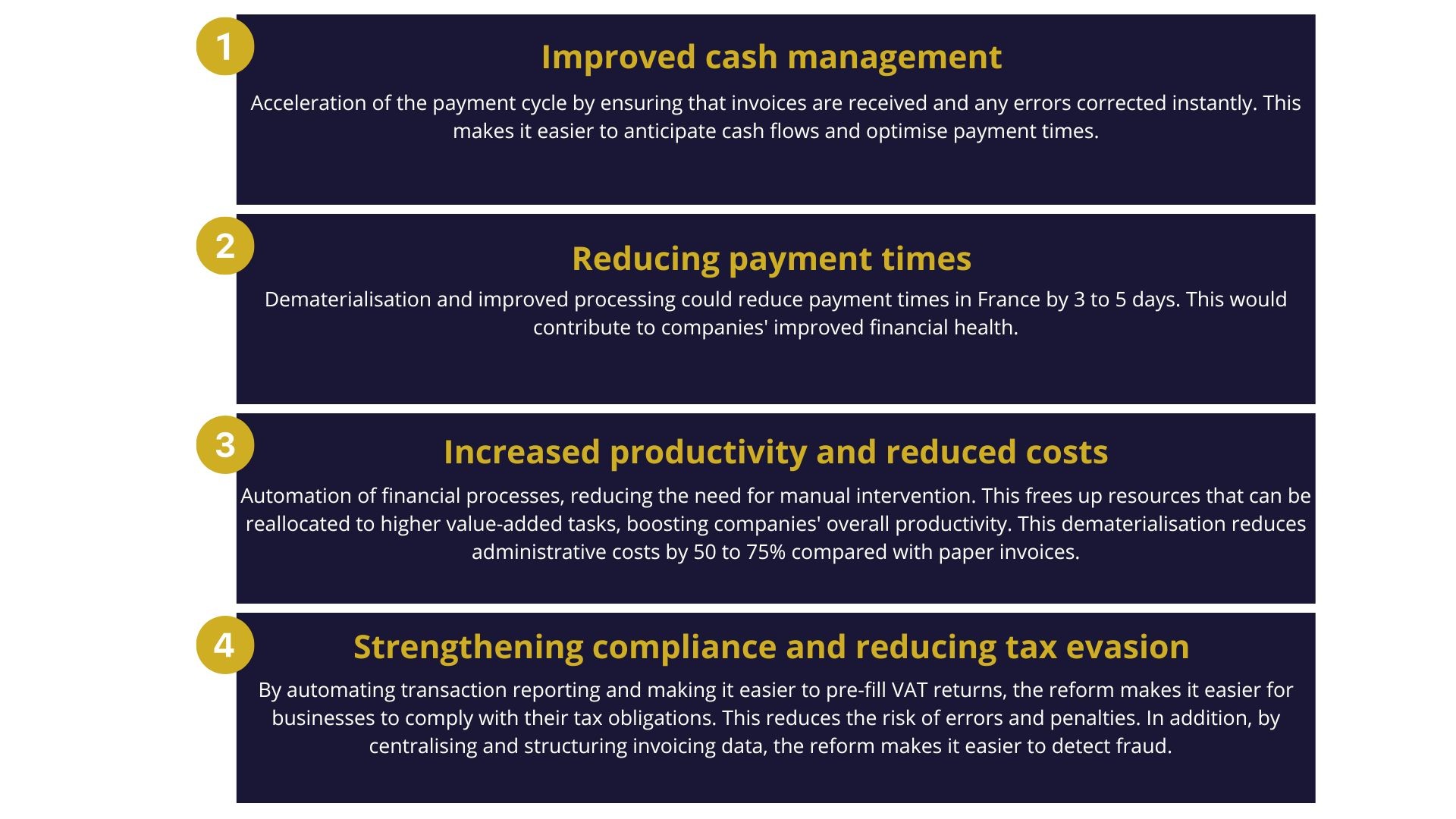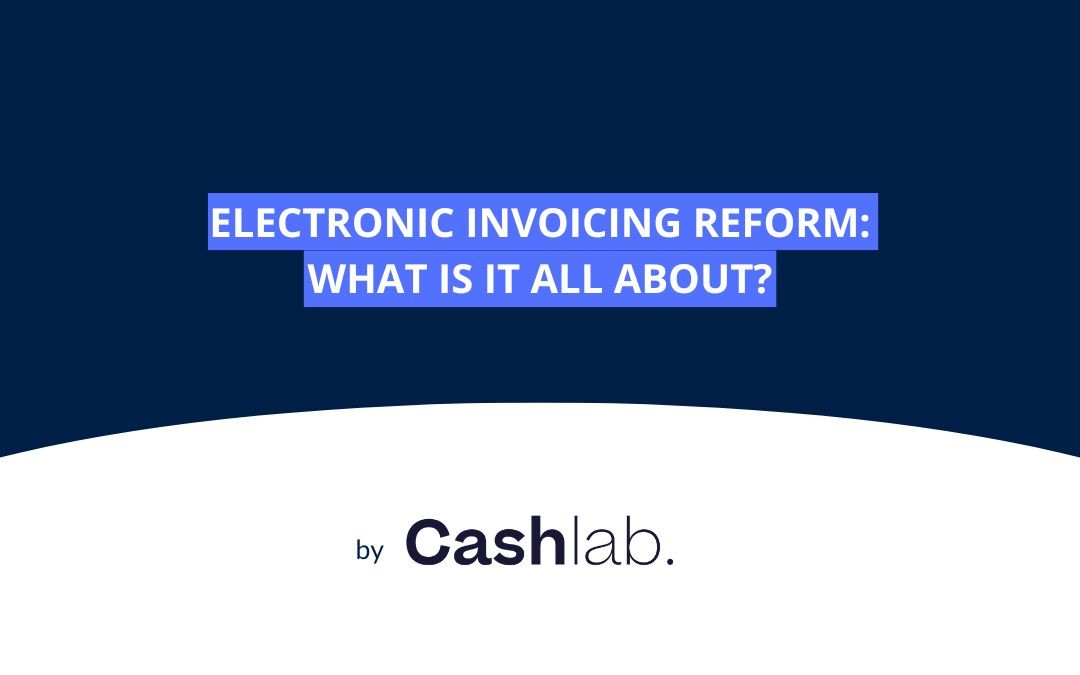Electronic invoicing will soon be a legal requirement for all businesses subject to VAT.
A new timetable has been put in place. From 1 September 2026, all businesses, regardless of size, will have to be able to receive electronic invoices. Large companies and very small businesses will also have to be able to issue their invoices by this date. For SMEs and VSEs, the obligation to issue invoices will come into force on 1 September 2027.
What are the benefits?

How does it work?
Electronic invoicing involves the fully digital management of the invoice lifecycle, from creation to archiving. Unlike paper or PDF invoices, these electronic invoices contain a minimum base of structured data, making them easier to search, analyse and file.
There are two options for issuing and receiving invoices:
- On the public invoicing portal (Chorus Pro)
- On a government PDP (Platform for Partner Dematerialisation). The DGFiP (Direction Générale des Finances Publiques) has just issued the first PDP certifications to the companies that submitted their applications, the names of which were published in August 2024. You can find the list of approved platforms on the website impôt.gouv
Unlike Italy, France has opted for a decentralised model (Y model), requiring a centralised directory to guarantee communication between platforms and businesses. This directory, considered to be the keystone of this model, will list all businesses subject to VAT, as well as the dematerialisation platforms connected to it. It will enable invoices to be correctly directed on the basis of information such as the Siren and Siret numbers of the recipients, to ensure that payments are made on time.
The transmission and reception of large volumes of data underlines the importance of data quality. A rigorous framework must be put in place to process, update and maintain this data. Incorrect or poor quality data can have a direct impact on a company's cash flow, by delaying payments.
The reform therefore puts the emphasis on the quality of invoicing data to ensure that invoices, which are crucial for payment, are received and processed correctly. Data will therefore have to be consolidated, cleaned and updated regularly to avoid errors and ensure compliance.
Reform opportunities
From an organisational point of view, electronic invoicing should lead to greater automation and, consequently, higher productivity. The resources freed up in this way can be allocated to higher value-added tasks. For example, accounting teams could devote the time saved to other tasks that are important for the company's development, rather than resolving problems linked to manual input errors or non-compliant invoices. This optimisation of day-to-day processes will lead to better decision-making and more efficient management.
The reform also offers other opportunities, such as the potential for optimising the ‘order to cash’ and ‘procure to pay’ processes, as well as the reduction in processing times thanks to the dematerialisation of flows, enabling immediate processing.
In addition, this reform could reduce late payments by eliminating technical and organisational obstacles, with the potential to reduce the average payment period by 3 to 5 days in France. However, it will have no positive effect on companies experiencing payment difficulties or on bad payers. On the other hand, it could encourage the adoption of fraud detection tools, thereby limiting fraud-related losses, which amount to several billion euros.
Finally, this reform could strengthen compliance, a key objective of the tax authorities, by ensuring full visibility of trade and VAT. By imposing a compliance framework for invoices when they are issued and received, the reform makes this possible.
Obstacles to and concerns about the reform
However, the reform of electronic invoicing also presents a number of challenges. On the hardware side, it requires companies' information systems (IS) to be harmonised and sensitive billing data to be secured. The choice of technology partner will therefore depend on existing infrastructures within companies, requiring organisational adaptation to go beyond simple compliance with the new reform.
What's more, this transformation requires significant financial investment and resources, particularly for change management, team training and stakeholder involvement. For large companies, complex governance (multi-entity, multi-billing) is a major challenge, while for small companies, financial investment and training for managers and staff, who are often unfamiliar with these changes, are the main difficulties.
AI and electronic invoicing
Artificial intelligence (AI) is now being integrated into more and more sectors, and this will not escape the reform of electronic invoicing. AI plays a crucial role in optimising financial processes by automating tasks, detecting fraud and improving data quality. It can help with prospective analysis, personalising invoices and resolving disputes.
Despite the delays, the reform of electronic invoicing in France promises major opportunities for optimising financial processes. However, it also poses challenges in terms of preparing businesses, securing data and managing change. AI will be a key tool for maximising the benefits of this reform.
The next challenges for the future of treasury in 2023: interview with Sabbir Rahman
Sabbir Rahman, former Head of Treasury for ASOS, explains the next 3 big challenges of treasury in 2023.
How to integrate crypto-currencies into your treasury?
Finance departments will have to deal with the use of crypto-currencies in cash flow. How to manage them?
Artificial intelligence & Cash Management
Artificial intelligence at the service of financiers: a new way to make cash flow forecasts more reliable?
![]()
📍1, rue des Prouvaires
75001 Paris
Follow us:
©2023 All rights reserved. | Cashlab | Legal Notice




